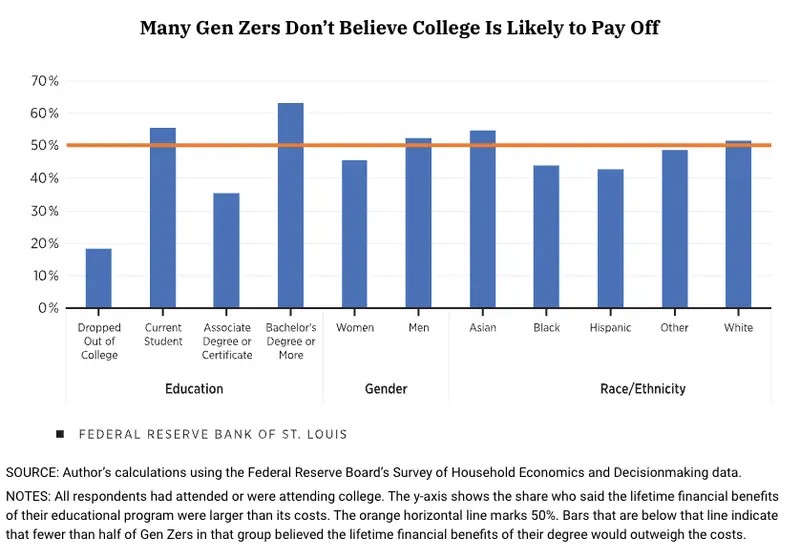Only 39% of Gen Z Say Higher Education is Important
Gen Z is saying no to college.
A new study by Business Insider in collaboration with YouGov surveyed more than 1,800 Americans across five generations, with more than 600 respondents belonging to Generation Z and above the age of 18. The study asked them about their sentiment towards the value of higher education. Just 39% of Gen Z said advancing education is important to them. Another 46% said they don’t think college is worth the cost.
Sadie Shaw, 22, is among those in Gen Z who are less willing to pursue college without a critical evaluation of its financial impact.
“My parents went to college, so did my brother, all my extended family went, it was just completely normal to me,” Shaw says. “And it wasn’t really until I got to college that I realized it wasn’t what I wanted to do.”
Two months after starting college, Shaw dropped out to make money as a TikTok creator selling fitness plans and to work as a store manager at a vintage clothing shop.
“It has been amazing for me to not be in debt,” Shaw says. “I have no student loans, like so many of my friends are in $100,000 in debt and student loans just to get a job that pays $60,000 a year.”

COST VS. BENEFITS
The average total cost of a public college education in the US is $104,108. At a private, four-year college, the cost is $223,360. Between 1980 and 2020, the average price of tuition, fees, and room and board for an undergraduate degree increased a whopping 169%.
For many Gen Z students, the thought of attending college, graduating with thousands in debt, and potentially not even using the degree just doesn’t make sense.
“When I’m talking to younger people of Gen Z, it seems like they’re very aware, and that might be a little bit of a shift,” says Ana Hernández Kent, a senior researcher with the Institute for Economic Equity at the Federal Reserve Bank of St. Louis. “So instead of just a blanket approach, and assuming that they need to go to college and that it’s going to pay off, they’re much more critical.”
To add to the sentiment, there’s an abundance of jobs that simply don’t require a college diploma. In fact, between 2020 and 2030, the Bureau of Labor Statistics projects that about 60% of new jobs in the economy will be in occupations that don’t typically require an associate’s, bachelor’s, or graduate degree.
“After the 70-year period in which policymakers and social commentators and community leaders all saying from the hymnal that you’ve gotta go to college to make it in America, that headline, that kind of postulate, has been overthrown,” says Joseph Fuller, a professor at Harvard Business School and co-lead of the school’s “Managing the Future of Work” initiative.
“That’s putting a lot of pressure on post-secondary institutions to think about ways to justify what they cost,” Fuller continues, “or to retrench so that they can live with a smaller amount of demand.”
PRESSURE ON COLLEGES TO ADAPT
Colleges are already feeling the impacts of Gen Z’s sentiments towards higher education. As of May, postsecondary enrollment remains significantly below pre-pandemic levels, with 1.16 million fewer undergraduates enrolled compared to the spring of 2020.
Experts say colleges need to adapt—or risk suffering the consequences.
“They’re going to have to adopt for a steely-eyed vision that the worth would be paid for,” Fuller says. “They’re going to have to work to demonstrate to potential students that graduates of their programs can enjoy success and a lifestyle that will support income level and support a household with a decent lifestyle.”
Sources: Business Insider, Education Data Initiative, Bureau of Labor Statistics. National Student Clearninghouse Research Center
Next Page: Survey shows nearly half of employers ready to dump the bachelor’s degree requirement.
Page 3: Winter To-do list for college applications.











